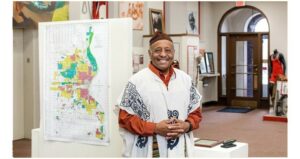That’s why 73-year-old history graduate student Clayborn Benson, who leads the Wisconsin Black Historical Society and Museum, is still educating himself and others.
“Mentally I wasn’t ready before, but I’ve been back for a year and a half and I’ve been blessed to receive mostly A’s,” he said. “I take one course per semester, and I’m able to manage that one course.”
Benson retired from WTMJ in 2007 after 39 years (1968- 2007) as a video journalist, and still works five days a week at the Wisconsin Black Historical Society’s Museum at 2620 W. Center Street.
He is used to juggling many roles.
While working as a news cameraman, he decided to improve his skills through a photography training program at Milwaukee Area Technical College. Then mid-career, after years of covering events all over Milwaukee and around the world, he decided to come to UWM to earn his bachelor’s degree in fine arts in film in 1987.
Sparking an interest in history
In working on that degree, Benson received a grant to do a three-part series, “Black Communities,” on the history of people, communities, housing and migration in Wisconsin. (It is still available on the museum Facebook page and through the Milwaukee Public Library.) That experience sparked his interest in history and a desire to collect and preserve the widely scattered documentation of the Black experience in Wisconsin.
For the past 35 years, Benson has been sharing that history through stories on social and public media, presentations to community groups as well as celebrations, exhibitions and events at the museum. (Most recently the museum was the site for the announcement of Milwaukee’s first Black female assistant fire chief, Sharon Purifoy-Smoots.)
He has received numerous awards for his work as both a visual journalist and historian. He was honored at a Milwaukee Bucks game during Black History Month this year and featured in the Milwaukee Journal Sentinel’s “Difference Maker” series.
From the time he was a youngster hanging out in a barbershop to now, Benson has always enjoyed telling stories. His work now gives him the opportunity to talk about the individual experiences of Black people as well as larger stories of events that have shaped Milwaukee and Wisconsin history.
An important resource
With the help of his daughter, who works there full-time, and volunteer staffers, the Wisconsin Black Historical Society and the museum have become a go-to resource for students and scholars, the media and others interested in learning more.
Benson is particularly interested in reaching out to schools and students to pass on what he and other elders have learned to the next generation. Among the many activities the museum offers are genealogy sessions for young people.
He advocates for the university to get even more involved with elementary and high school students, particularly in urban schools. He has faith in these students’ abilities to overcome challenges.
“There’s nothing any one of those kids can’t get over and learn how to do.”
Step by step
He bases that optimism on his own life experiences. “I would be embarrassed to tell you what my educational levels were. It took a great deal of work to raise my levels so I could be a good student in school.”
His experiences at UWM and the support of family have helped him educate himself and others. That’s why he continues to work toward a master’s degree — one semester at a time.
“I have to say my real identity and understanding of who I am has come out of my learning here at UWM. My readings have really helped me get a clear understanding of the choices I’ve made in my life and what I want to devote my life to. All good things come out of education. It totally changed my life, not only the way I see myself, but it empowered me.”
